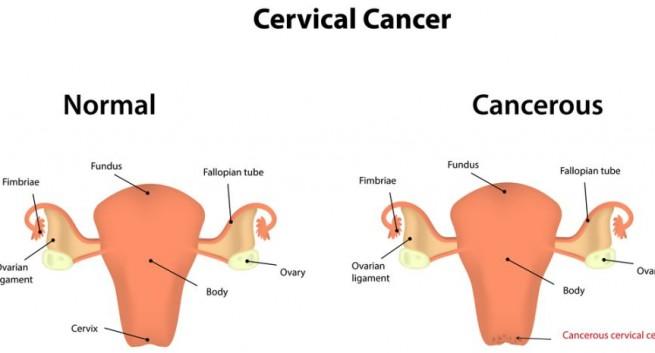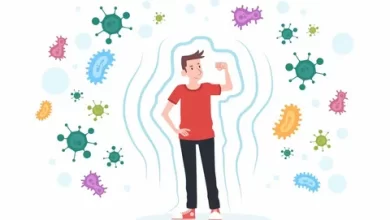SYMPTOMS AND POSSIBLE PREVENTION OF CERVICAL CANCER
Preventing Cervical Cancer


Most women do not have any signs or symptoms of a precancer. In many women with early-stage cervical cancer, symptoms do typically appear. In women with advanced and metastatic cancers, the symptoms may be more severe depending on the tissues and organs to which the disease has spread. The cause of a symptom may be a different medical condition that is not cancer, which is why women need to seek medical care if they have a new symptom that does not go away.
Table of Contents
Any of the following could be signs or symptoms of cervical cancer:
- Blood spots or light bleeding between or following periods
- Menstrual bleeding that is longer and heavier than usual
- Bleeding after intercourse, douching, or a pelvic examination
- Increased vaginal discharge
- Pain during sexual intercourse
- Bleeding after menopause
- Unexplained, persistent pelvic and/or back pain
Any of these symptoms should be reported to your doctor. If these symptoms appear, it is important to talk with your doctor about them even if they appear to be symptoms of other, less serious conditions. The earlier precancerous cells or cancer is found and treated, the better the chance that the cancer can be prevented or cured.
If you are concerned about any changes you experience, please talk with your doctor. Your doctor will ask how long and how often you’ve been experiencing the symptom(s), in addition to other questions. This is to help figure out the cause of the problem, called a diagnosis.
If cervical cancer is diagnosed, relieving symptoms remains an important part of cancer care and treatment. This may be called palliative care or supportive care. It is often started soon after diagnosis and continued throughout treatment. Be sure to talk with your health care team about the symptoms you experience, including any new symptoms or a change in symptoms.
Prevention
Cervical cancer can often be prevented by having regular screenings to find any precancers and treat them, as well as receiving the HPV vaccine.
The HPV vaccine Gardasil is approved by the U.S. Food and Drug Administration (FDA) for prevention of cervical cancer caused by HPV (see Risk Factors) for people between 9 and 45 years old. Gardasil 9 is available in the United States for preventing infection from HPV16, HPV18, and 5 other types of HPV linked with cancer. There were 2 other vaccines previously available in the United States: Cervarix and the original Gardasil. Both of these are no longer available in the United States. However, these vaccines may be in use outside of the United States.
To help prevent cervical cancer, ASCO recommends that girls receive HPV vaccination. Talk with a health care provider about the appropriate schedule for vaccination because it may vary based on many factors, including age and vaccine availability. Learn more about HPV vaccination and ASCO’s recommendations for preventing cervical cancer.
Additional actions people can take to help prevent cervical cancer include:
- Delaying first sexual intercourse until the late teens or older
- Limiting the number of sex partners
- Practicing safe sex by using condoms and dental dams
- Avoiding sexual intercourse with people who have had many partners
- Avoiding sexual intercourse with people who are obviously infected with genital warts or show other symptoms
- Quitting smoking
For any important information please contact us Email GadgetsNg info@gadgetsng.com
[Button id="1"]




It’s not that I want to copy your web site, but I really like the style. Could you let me know which theme are you using? Or was it especially designed?
Wow, amazing blog layout! How long have you been blogging for? you make blogging look easy
Full day of music presentations here in San Fran. Luv these days! We The Kings, and Diane Birch kicked it off! So hot.|RonASpaulding|
i get my art books from barnes and noble that come or amazon, they have some great discount coupons too.
You certainly deserve a round of applause for your post.
Some really nice stuff on this web site , I like it.
Job seekers also can benefit from seduction approaches. When on job interview, you can mesmerize your job interviewer while using maneuvers you have mastered inside seduction procedures. Not that you are tempting these folks to indulge in to lovemaking things to do, nevertheless , you might impress these people with the way you are generally increasing your mid-section. Seduction techniques can easily tame every roaring beasts.
Good write-up, I?m normal visitor of one?s web site, maintain up the nice operate, and It is going to be a regular visitor for a lengthy time.
Please visit these excellent download sites and download all cool stuffs for free.
Good ¡V I should certainly pronounce, impressed with your site. I had no trouble navigating through all the tabs and related info ended up being truly easy to do to access. I recently found what I hoped for before you know it in the least. Quite unusual. Is likely to appreciate it for those who add forums or something, site theme . a tones way for your customer to communicate. Nice task..
Wonderful article. Thanks too much for the breakdown you have presented here. I am still sort-of an illiterate on this topic. So this post was really helpful to me personally. My husband just launched his own ebook on this issue and I think some things learned from your post would enable me personally to give him the necessary support. Thanks!
very nice post, i definitely enjoy this excellent website, persist in it
Based on my research, after a property foreclosure home is bought at an auction, it is common for any borrower to be able to still have any remaining balance on the mortgage loan. There are many lenders who try to have all costs and liens cleared by the following buyer. On the other hand, depending on particular programs, laws, and state guidelines there may be several loans which are not easily resolved through the shift of lending options. Therefore, the duty still rests on the lender that has received his or her property in foreclosure. Many thanks sharing your notions on this site.
Great post man, keep the nice work, just shared this with my friendz
Just where maybe you’ve discovered the supply for the purpose of this kind of post? Wonderful studying I have subscribed to your site feed.
Gucci Handbags In the event that the american dollar crashes (we am convinced of) then gold certainly is the absolute best area to make your money.
Whoah this weblog is great i love studying your articles. Keep up the great work! You know, many people are searching around for this info, you could aid them greatly.
It??s good site, I became seeking a product like this
art posters are great for room decoration too, i use art posters on my bedroom as decorations`
Electronic Cigarette is absolutely a good choice for people who want to quit smoking. You can enjoy the same taste as traditional tobacco cigarette with it!
I enjoy the efforts you have put in this, appreciate it for all the great articles.
it is sometimes kinda sad to watch some episode of Army Wives specially when there is a dead soldier**
Spot on with this write-up, I truly suppose this web site wants way more consideration. I’ll most likely be once more to learn way more, thanks for that info.
Thanks for your article. I would like to comment that the very first thing you will need to do is check if you really need repairing credit. To do that you simply must get your hands on a copy of your credit rating. That should never be difficult, considering that the government necessitates that you are allowed to get one cost-free copy of your real credit report yearly. You just have to check with the right people. You can either look at website for that Federal Trade Commission and also contact one of the major credit agencies directly.
Awesome read , I am going to spend more time learning about this subject
Paris Hilton: So lovely spending time with Manny and h
Bereken zelf uw hypotheek. Hypotheek berekenen? Maak snel een indicatieve berekening van het maximale leenbedrag van uw hypotheek.
well done . Thanks for info . Ill be back. Thanks again
?ekai? Seemed like it was just yesterday those celebrity endorsed Flip ads were plastered all over town
What’s Going down i’m new to this, I stumbled upon this I’ve discovered It absolutely useful and it has helped me out loads. I hope to give a contribution & aid other customers like its helped me. Great job.
Very well said, your blog says it all about that particular topic.:-,*;
I discovered your website website on google and check many of your early posts. Continue to keep within the really good operate. I merely additional increase Feed to my MSN News Reader. Seeking toward reading a lot more of your stuff at a later time!…
It is best to take part in a contest for top-of-the-line blogs on the web. I’ll recommend this website!
Perfect piece of work you have done, this site is really cool with great information.
Great looking web site. Precisely what theme are you presently making use of?
This unique website is amazing. We continually come upon something new as well as various appropriate here. Thank you for which information.
Im no pro, but I suppose you just crafted a very good point point. You obviously know what youre talking about, and I can truly get behind that. Thanks for staying so upfront and so straightforward.
I’d ought to talk to you here. Which is not some thing It’s my job to do! I love to reading a post that may make people believe. Also, thanks for allowing me to comment!
I merely picked up your blog post a couple weeks ago i have actually been perusing this tool always. An individual has a lot of helpful tips at this point we absolutely love your lifestyle of a internet sites actually. Stick to the nice perform!
It’s difficult to find knowledgeable individuals for this topic, nevertheless, you could be seen as do you know what you are talking about! Thanks
Rich, I use sponsorspace for my sponsorship program sponsor me
I just rick-rolled myself for the heck of it. LOL…it’s just effin’ catchy.
hello, your website is really good. We do appreciate your give good results
It’s one thing to show conflict between the two but when they come to blows, it just seemed so un-Spocklike.
This is an astonishing entry. Thank you very much for the supreme post provided! I was looking for this entry for a long time, but I wasn’t able to find a trustworthy source.
I am frequently to blogging and i genuinely appreciate your posts. This article has truly peaks my interest. I am about to bookmark your website and keep checking choosing details.
infant clothing should be as comfy as possible because infants can really nag if they have bad clothing`
I’m extremely impressed with your writing skills and also with the layout on your blog. Is this a paid theme or did you modify it yourself? Either way keep up the nice quality writing, it is rare to see a nice blog like this one these days..
I like this post, enjoyed this one appreciate it for putting up.
As soon as I noticed this website I went on reddit to share some of the love with them.
You really should experience a contest for starters of the highest quality blogs on the internet. I most certainly will recommend this web site!
You have a very nice layout for your blog, i want it to use on my site too “
Can I merely say thats a relief to uncover someone who actually knows what theyre dealing with over the internet. You definitely discover how to bring a worry to light and work out it critical. Lots more people must ought to see this and can see this side on the story. I cant believe youre no more common simply because you certainly contain the gift.
Thanks for the sensible critique. Me & my cousin were just preparing to do some research about this. We grabbed a book from our area library but I think I learned more from this post. I am very glad to see such great info being shared freely out there.
Eating foods rich in probiotics is the best way to make sure you’re keeping your gut flora healthy, however, people with dietary restrictions may need to supplement. When choosing a probiotic supplement, just make sure it contains high quality cultures and bacterial cultures that would naturally be found in the human intestines.
Thank you for each of your efforts on this web page.
Hope you will update the article. I still like the blog
What would be your next topic next week on your blog.”\”–,
The next occasion I read a weblog, I am hoping that this doesnt disappoint me just as much as this. I mean, Yes, it was my substitute for read, but I just thought youd have something fascinating to talk about. All I hear can be a bunch of whining about something that you could fix when you werent too busy searching for attention.
What i don’t understood is in truth how you’re no longer really a lot more well-liked than you might be now. You are very intelligent. You understand thus considerably in terms of this topic, made me individually consider it from numerous varied angles. Its like men and women are not fascinated unless it¡¦s one thing to accomplish with Woman gaga! Your personal stuffs outstanding. Always maintain it up!
You should get involved in a contest for example of the most useful blogs on-line. Let me recommend this page!
pay per click programs are really great, i could earn some decent cash from it-
After study a number of the websites with your site now, and that i genuinely appreciate your method of blogging. I bookmarked it to my bookmark site list and are checking back soon. Pls have a look at my web page likewise and let me know if you agree.
It seems you are getting quite a lof of unwanted comments. Maybe you should look into a solution for that. …
Je pourrais vous transférer les url pour plus de miniatures sur cette question. Ecrivez moi simplement…
Wow! This can be one of the most useful blogs we have ever come across on thesubject. Basically excellent article! I am also an expert in this topic so I can understand your hard work.
It’s onerous to seek out educated individuals on this topic, but you sound like you already know what you’re speaking about! Thanks
Only a few blogger would discuss this topic the way you do…-:`
Universial Studios offers one of the best studio in Hollywood, they also make great films**
I agree with you. I wish I had your insight.
I think this is a really good site. You definately have a fabulous grasp of the subject matter and explain it great.
Fantastic goods from you, man. I’ve understand your stuff previous to and you’re just extremely excellent. I really like what you’ve acquired here, certainly like what you are stating and the way in which you say it. You make it enjoyable and you still care for to keep it sensible. I can’t wait to read much more from you. This is actually a great website.
I surely didn’t understand that. Learnt a thing new today! Thanks for that.
Hello there, just became aware of your blog through Google, and found that it is truly informative. I am going to watch out for brussels. I’ll appreciate if you continue this in future. A lot of people will be benefited from your writing. Cheers!
We still cannot quite think We can often be those checking important points positioned on your webblog. Our kids and that i are sincerely thankful on your generosity and then for giving me possibility pursue our chosen profession path. Just material Managed to get on the web-site.
Loving the info on this web site , you have done great job on the blog posts.
online shopping pharmacy india http://indiaph24.store/# world pharmacy india
top online pharmacy india
Hi, this is fantastic content. I truly liked. But there are tons of off topic comments. I really advise you to remove or something like that. That’s only my estimation. Best of luck!
The the next occasion I read a weblog, Lets hope so it doesnt disappoint me about this place. After all, I know it was my choice to read, but I actually thought youd have something interesting to express. All I hear can be a few whining about something you could fix in the event you werent too busy looking for attention.
Hi this is somewhat of off topic but I was wondering if blogs use WYSIWYG editors or if you have to manually code with HTML. I’m starting a blog soon but have no coding skills so I wanted to get advice from someone with experience. Any help would be greatly appreciated.
Intimately, the post is actually the freshest on that laudable topic. I match in with your conclusions and also definitely will thirstily look forward to your approaching updates. Just saying thanks can not simply be adequate, for the outstanding lucidity in your writing. I can immediately grab your rss feed to stay informed of any kind of updates. Solid work and much success in your business enterprize!
I do believe all of the ideas you’ve introduced on your post. They are really convincing and can definitely work. Still, the posts are too brief for newbies. Could you please lengthen them a bit from subsequent time? Thank you for the post.
i like it jobs because it is a high paying job and you work in an air conditioned office**
Hey there. I want to ask some thing…is this a wordpress blog page as we are planning to be changing over to WP. Moreover did you make this theme yourself? With thanks.
You produced some decent points there. I looked over the internet for that issue and discovered most people is going along with together with your website.
I have learned newer and more effective things by means of your blog. One other thing I’d like to say is that newer personal computer operating systems are inclined to allow extra memory to get used, but they likewise demand more memory simply to function. If a person’s computer can’t handle extra memory and also the newest computer software requires that memory increase, it could be the time to buy a new Laptop. Thanks
There is noticeably a lot of money to know about this. I assume you have made specific nice points in features also.
well, i bought some digital pedometer on the local walmart and it is great for monitoring your performance when walking-
Your blog has the same post as another author but i like your better.*:~;’
very good post, i definitely enjoy this excellent website, keep on it
Gucci Handbags Just need to say your article is striking. The clearness within your submit is just spectacular we can take as a right that you are an professional with this field. Exceptionally well with the permission help me to seize your rss feed to sustain up to now with forthcoming deal. Thank you millions of and please cultivate the helpful operate.
I am curious to find out what blog platform you happen to be using? I’m having some minor security issues with my latest blog and I would like to find something more risk-free. Do you have any suggestions?